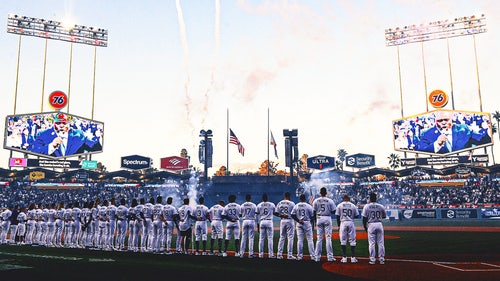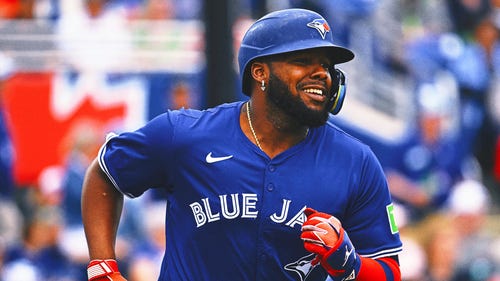
Will high-tech changes ruin baseball?
This week in New York City, another tradition of the beautiful, nostalgic game of baseball began its long, slow death.
Instant replay is officially now a part of the game.
The umpire is dead.
Sure, a slightly overweight, grumpy man will still squat behind the catcher on each and every pitch. And a few more grumpy men will position themselves around the infield, trying their best to get out of the way of screaming liners. The grumpy men will make calls — ball or strike, fair or foul — but make no mistake: The road we’re heading down in Major League Baseball will lead to the possibility of a red flag being thrown on each and every questionable call.
Despite the fact it’s inevitable in our tech-fetishized world, instant replay will kill one of baseball’s finest traditions. Instant replay will kill the bad call. It will kill the boo-birds wanting to kill the ump. It will kill the crowd-thrilling, dirt-kicking, profanity-screaming and occasionally spittle-showering baseball tradition of the argument with the ump.
That wonderful tradition will be replaced by a mind-numbingly boring, pace-killing, bathroom-break-encouraging Conference of the Umps, where a definite answer of fair or foul will come by way of replays from a dozen different angles. It will kill the moments of baseball lore where an ump is (unfairly) memorialized by his poor decision of a split-second. It will strike from baseball history books the next Don Denkinger, or the next Jim Joyce.
Advanced replay technology, such as that used in tennis, was reportedly being tested as soon as this week at Yankee Stadium and Citi Field. Results of the experiment could lead to changes to MLB's replay procedures by next season.
With the cameras or radars that will be in place throughout the game next year, soon enough, the umpire will be obsolete.
Which is enough to get you thinking: So what’s the next baseball tradition to die?
What might this game look like in 40 years? Will umpires be replaced by fair/foul robots and a heat-sensor strike zone monitoring system? Will the hilarious moment of the grounds crew rolling out the tarp during a rain delay be replaced with quick-closing stadium roofs, or individual ballpark biospheres, or self-drying artificial turf? Will the seventh-inning stretch become a communal popping of a seventh-inning muscle relaxer pill?
One of baseball’s finest and longest traditions is already under attack. A recent New York Times article quoted players and managers doubting the usefulness of pregame batting practice, with many saying the more effective work is done in the bowels of the stadium, off the tee or in indoor batting tunnels. It’s true that the effectiveness of hitting slow fastballs thrown by an out-of-shape coach from half the distance of the pitcher’s mound is questionable at best.
But it’s a tradition, dammit. And it’s our tradition.
The beautiful, idealized vision of America’s pastime is that it hasn’t changed since Abner Doubleday: 90 feet between bases, 60 feet 6 inches from the pitching rubber to home, a round ball getting swung at by a round bat. As with all idealized visions, the unchanged nature of the game of baseball is not true. The dead-ball era of the early 1900s became the live-ball era of Babe Ruth. The racist game of Ty Cobb opened up to all under the heroism of Jackie Robinson and Branch Rickey. The owner-monopoly of the mid-1900s broke with the courage of Curt Flood and the advent of free agency. America’s pastime changes as America changes.
But there’s still something timeless about baseball, a feeling that the game you’re watching today could be set in any era. There’s still something calming about an afternoon in the sun with a beer and a hot dog, despite the fact that today’s innings are interrupted by sausage races and Kiss Cams. There’s still something quaint about the seventh-inning stretch, despite that for many it merely marks our last shot to grab a beer before the concessions stand closes.
Instant replay will change the game. Of that there is no doubt. It will make calls more accurate but less human. It will cut into the momentum-shifting drama of a manager getting tossed for going ape shit on an ump. And the game a generation or two from now will look permanently different because of it. I suppose debating whether that’s a good thing or a bad thing is beside the point. It’s a true thing, and you can’t stop the march of progress.
But let’s hope the future of baseball still has the timeless traditions that have endured since damn near the time of Abner Doubleday.
Let’s hope we still have brushback pitches and intentional beanings, and let’s hope the batter still charges the mound.
Let’s hope those skinny, goofy fungo bats that coaches and managers like to use aren’t replaced by automatic groundball machines.
Let’s hope the box scores of the ink-and-paper era endure in the Internet world.
Let’s hope the secretive sign language of catcher to pitcher, or third-base coach to batter, isn’t replaced by microchips in the ball cap or telepathic technologies.
Let’s hope the scourge of performance-enhancing drugs reverts to the old, homey, creative traditions of cheating in baseball: the spitball, the corked bat, the stealing of signs.
Moan if you want about instant replay. The game and its traditions will change. These are blips on the radar of baseball history compared with the monumental, game-changing and game-improving shifts like the glorification of the home run or the breaking of the color barrier.
But no matter how many intrusions technology will make into the game in coming generations, you can be assured of several things: The pitcher will still stand 60 feet 6 inches from the batter, and first base will still be 90 feet from home. The hot dogs will still be salty, the beer still cold. And on any given summer afternoon on the North Side of Chicago, the bleacher bums will be sipping their Old Style, the ghost of Harry Caray will linger, and my lovable Chicago Cubs will be down by at least a few runs. Some things will never change.
Follow Reid Forgrave on Twitter @ReidForgrave or email him at ReidForgrave@gmail.com.










